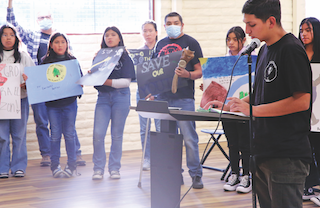Members of the California Department of Pesticide Regulation (DPR) presented a plan on Oct. 30 that aims to strengthen the way the state regulates agricultural pesticides—but many members of the public expressed skepticism over the effectiveness of the regulations.
The four-year plan was presented in Watsonville to a crowd of about 50 people at the Ramsay Park Family Center.
If approved, it aims, among other things, to reduce California’s dependence on toxic pesticides, gradually replacing them with less toxic products and chemicals. Presenter Karen Morrison, the DPR’s Chief Deputy Director, also touched on being transparent to the public with a mission of “protecting human health and the environment.”
But people from Watsonville, Salinas, Gonzales and as far away as Santa Maria and Ventura took turns at the open mic to voice concerns and doubts about the plan.
One person questioned the timing of the meeting—4pm on a Monday—a time when many farmworkers are heading home to clean up for dinner and unable to attend.
Victor Torres, 17, addressed environmental and racial justice, saying he was exposed to pesticides at a young age and had to be rushed to the hospital.
“Many of those pesticides that were applied that day that caused my asthma attack are still on the market and are used throughout the state,” he said. “I am here today… to advocate for other members of my community that couldn’t be here today. Stop prioritizing profits over people’s lives.”
Woody Rehanek of Watsonville, a former farmer, said in the Pajaro Valley Unified School District, 67 farms, greenhouses and nurseries are within a quarter-mile of schools.
“16 growers are organic; 50 growers use conventional chemicals,” he said. “Conventional berry farms within a quarter-mile of schools use the carcinogenic fumigant 1,3-D, which has been banned in 34 countries. Does this make sense?”
He stressed that while California boasts the strictest pesticide regulations in the world, it allows 133 chemicals that the European Union has either banned or not registered for use at all.
“The European Union just voted to eliminate 50% of all pesticides by 2030, and 65% of restricted pesticides by that date,” he said. “California needs to follow this lead while converting to organic, regenerative agriculture. Instead, DPR proposes eliminating 50% of restricted pesticides by 2050.”
After reading the plan, retired certified organic farmer of 30 years, Tom Willey said, “I don’t know why there is no recognition or even encouragement for the adoption of organic production.”
He pointed out that there are around two million certified organic acres in the state and that such farming practices largely eliminates all toxic inputs into production systems, “and if that is seemingly your ultimate goal, I can’t figure out why you’re not willing to encourage the adoption of certified organic farming.”
Watsonville resident and former PVUSD middle school teacher, Sarah Ringler, raised the health implications on consumers as well as farmers.
“Getting rid of pesticides saves lives in the fields but it also saves lives of consumers—so why does the United States do such a poor job of protecting its consumers?” Ringler said.













